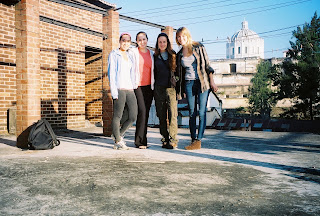
All of our exams were done inside the women's own homes today. The two I saw were both tiny one room houses with nothing more than a bed, dresser, and armoir. Dirt floors. Maybe one tiny window. It's so humbling spending time in a home of a family that is not even half the size of my bedroom, my own privilege glaring back at me. The houses are well cared for, swept, with everything in its right place. I am trying to be aware of our presence and its connotations for these women. We are coming from a place of power as "the expert" and I want to be cognizant of not portraying some sense of authority or hierarchy ... simple things like sitting down at her level instead of towering over her while she sits on her bed. Looking her in the eye and smiling. Laughing at my horrible Spanish accent.
The most difficult for me at this point is talking about the children they have lost. I don't know the appropriate thing to say, especially in another language. Women here aren't supposed to express emotion over losing a child. Death, even from something like a congenital defect, is often blamed on the mother - she must have sinned during her pregnancy, she didn't pray hard enough, or she has a hex on her. How do you respect her culture when you think it is okay to grieve and don't believe in a vengeful god or witchcraft (unless we are talking about doom metal) and can see she is in obvious pain when talking about it? It reminds me of something I read in Pathologies of Power by Paul Farmer, one of our assigned readings for this trip ...
"Although trained in anthropology, I, like most anthropologists, do not embrace the rigidly particularist and relativist tendencies popularly associated with the discipline. That is, I believe that violations of human dignity are not to be accepted merely because they are buttressed by local ideology or longstanding tradition."
The kids today were so exhausting. There were a ton of little boys, who were adorable, but way more aggressive, forward, and sneaky! than the girls. They climb all over the truck asking for gifts and games. I made the mistake of handing out some stickers and was completely bum-rushed and swarmed. Probably the closest I will ever get to feeling like Michael Jackson. Besides my nose job and red leather fetish.
goofin'









































